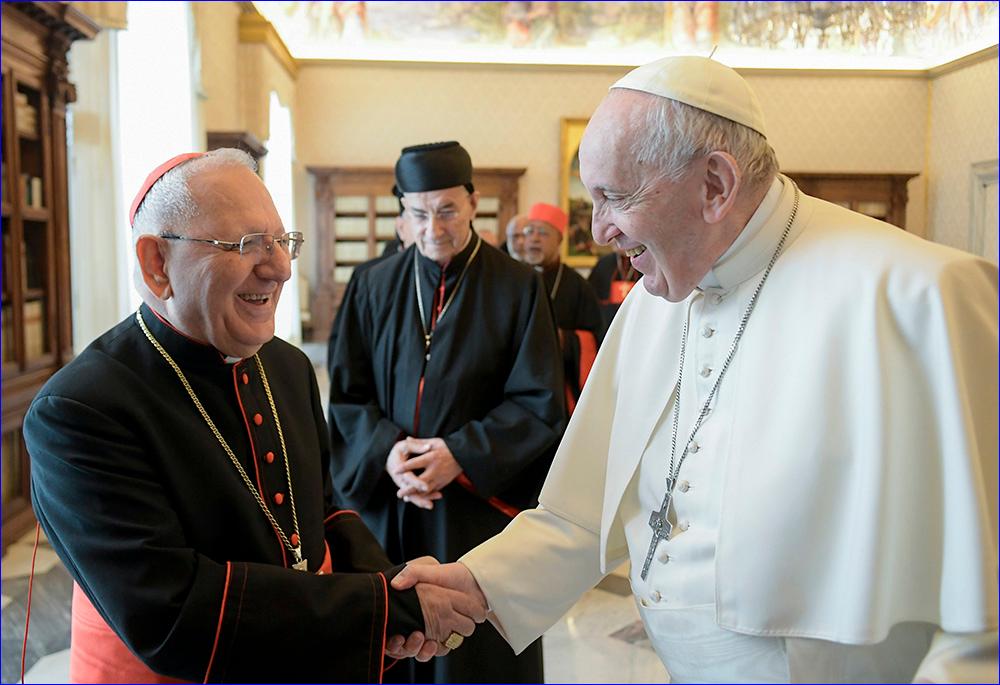


 CNS/Vatican Media)
CNS/Vatican Media)
But speaking to NCR in late March, the prelate expressed hope that an upcoming meeting in Washington between Iraqi Prime Minister Mohammed Shia al-Sudani and U.S. President Joe Biden may have a positive impact on his case. "We are fighting and resisting," Sako said, speaking via phone from Irbil, the capital of Kurdistan.
"The prime minister is visiting the United States," said Sako. "I hope they can do something to ask him for the benefit of Christians and to keep Christians in their land with hope and living in dignity and freedom."
Chaldean Catholics make up the bulk of Iraqi Christians, but have seen their numbers diminish. They numbered around 1.5 million before the 2003 U.S.-led invasion of Iraq, but sectarian violence over the years has depleted their numbers to some 150,000, according to the 2022 Report on International Religious Freedom by the U.S. State Department. Now, their parliamentary seat allotment and properties are under threat by Shiite militias, who exert influence on the country's government.
Nadine Maenza, president of the Washington-based International Religious Freedom Secretariat, said the Iraqi government's July 2023 revocation of the decree recognizing Sako's status "was a pivotal [moment] for Christians and should have raised red flags for us internationally to be more supportive."
Maenza has visited with Sako in Irbil. Her organization encourages the improvement of religious freedom conditions in 40 countries worldwide, including Iraq.
Rayan al-Kildani, an Iraqi Christian militia leader of the Babylon Brigades and lawmaker with ties to Iran, is believed to have influenced the Iraqi president's action to revoke the decree. Critics accuse al-Kildani of seeking to control Chaldean Church assets, which Sako oversees. The U.S. Department of the Treasury sanctioned al-Kildani in 2019 for alleged human rights abuses.
"The Babylon Brigades militia has nothing to do with Christianity or morality. They are putting their hands on anything Christian," Sako said.
Speaking to NCR, Maenza described the situation of Christians in Iraq as "dire," as Iran-backed Shiite militias gain more influence over the government. "Which is why Cardinal Sako left Baghdad and moved to the Kurdistan region," she said. "It's troubling to see what this means for one of the oldest Christian communities in the world."
"I am a bit like a refugee," Sako told NCR. "I wanted to give a message to the Iraqi government that this is a bad decision and a kind of protest."
Still, Sako is busy in Irbil keeping in touch with Chaldean Catholic dioceses and parishes as well as working in the seminary, aiding with the formation of seminarians, and celebrating Mass in towns and villages "just to encourage people to stay," he said. The church also has provided some $80,000 in support to help those in need. "We are doing what we can, but it is different from my headquarters [the patriarchate offices in Baghdad]."
In solidarity with Sako, the patriarchate announced that Chaldean Catholics were canceling Easter celebrations this year to protest the presidential decision revoking his title of patriarch, instead calling the faithful to prayer.
Religious freedom activist Maenza said that if Iraq's top Catholic leader, Sako, found the threats in Baghdad difficult, forcing him to relocate to Kurdistan, "imagine the vulnerabilities other Christians feel with the growing threats from Iran-backed militias."
"It's hard to believe that just three years ago, Pope Francis' visit to Iraq was such a celebration of Christians and they were treated with some level of respect as indigenous components of Iraq," Maenza said.
"Now we see Iran taking inch by inch in Iraq and Riyan al-Khaldani taking power, with the militias rising, and the numbers of Christians dropping. The combination of all of these things taking place, as the U.S. has pulled back from this region, means that bad actors have filled those gaps," she said.
Sako was instrumental in making the landmark March 2021 papal visit possible, a real feat during the coronavirus pandemic. The pope's visit made a major impression on ordinary Iraqis, he said, but a different government from that time is now in place, influenced by Iran.
"The Iraqi population is different. They are so nice with us. The pope during his visit changed their [the Iraqi population's] minds. They are doing nothing against us Christians. They are showing us their solidarity, but not the political class," Sako said.
The cardinal also said he feels that the Vatican has been "really timid" regarding any intervention on his behalf to restore recognition by the government of his title as patriarch. "Here in Iraq, the regime is sectarian not secular. We need the support of the Vatican to keep and protect us in our homeland," he said.
Sako has been at the forefront of pressing for all Iraqi citizens, including Christians, to have equal rights before the law, but says he has seen few positive results from the current government.
"The situation is very critical, and Christians have no trust for the future. Christians are still leaving the country because there are no actions, only promises," he said.
"I don't see progress of a real state in which everyone can live in dignity and freedom," said the cardinal. "Everything is sectarian."
Maenza said that she has urged the Biden Administration to take up this matter with Iraqi Prime Minister al-Sudani during his Washington visit, and to also raise concerns about the deterioration of Kurdistan's autonomous status. But it's unclear how much leverage the U.S. will have on the Iraqi leader, amid rising demands for the withdrawal of remaining American forces from the country.
"Kurdistan has been a place of refuge for religious minorities, like the Yazidis and Christians," Maenza said. "That's why Cardinal Sako is there."
NCR contacted several other Chaldean Catholic clerics in Iraq for their comments, but they declined to speak, citing the fraught political situation in the country.

or register to post a comment.